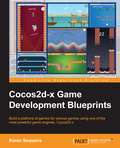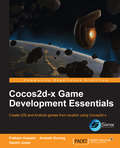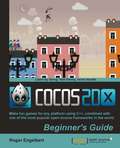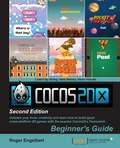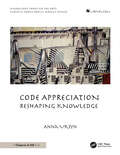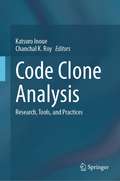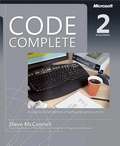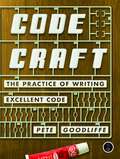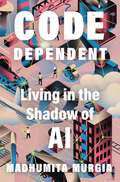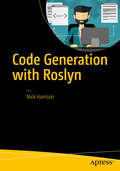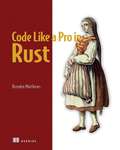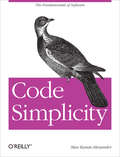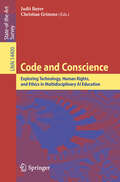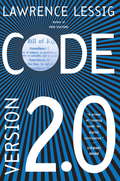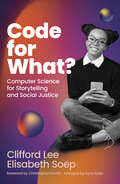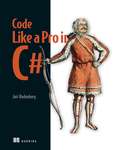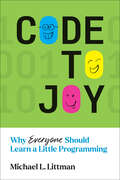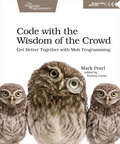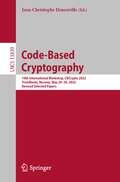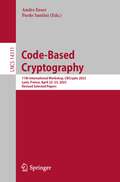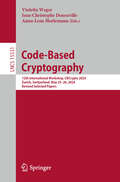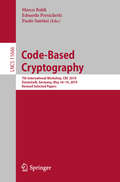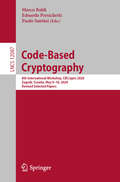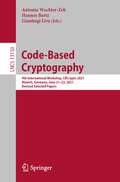- Table View
- List View
Cocos2d-x Game Development Blueprints
by Karan SequeiraIf you are a proficient Cocos2d game developer who wants to enhance his or her game development skill set using Cocos2d-x to build different types of games, this book is for you.
Cocos2d-x Game Development Essentials
by Gareth Jones Arutosh Gurung Frahaan HussainThis book is designed to help existing developers who are looking to learn this amazing framework, which provides cross-platform development. It is also perfect for developers who already have an existing C++ foundation and would like to learn game development using Cocos2d-x, or those who are coming from another framework.
Cocos2d-x by Example Beginner's Guide
by Roger EngelbertGet to grips with Cocos2D-X using step-by-step examples. Roger Engelbert will have you smiling throughout and learning valuable information at every turn.If you have brilliant ideas for amazing games and want to bring them to life, then this book is what you need. Work through easy-to-follow examples and learn exactly what you need to know to make your games a reality.No programming experience necessary!
Cocos2d-x by Example: Beginner's Guide - Second Edition
by Roger EngelbertIf you are a game enthusiast who would like to develop and publish your own game ideas onto different app stores, this is the book for you. Some knowledge of C++ or Java is helpful but not necessary.
Code Appreciation: Reshaping Knowledge
by Anna UrsynLike art appreciation and music appreciation, this code appreciation book invites the readers to look relaxedly into major programming concepts used in many disciplines through short stories set in alphabetical order. Some students fear technology with programming behind it, and shy away from the word "coding." Coding has become common and needed, and these stories are set to help non-coders lose their inhibition. It also might help with prompt writing. Many employers seek employees with experience in visual communication, technology, and storytelling skills. Most tasks are created through group efforts, so a better grasp of what other co-workers are doing speeds up the process.The book offers a new approach to storytelling by weaving coding into stories. Playfully, it encourages the readers to see computing as easier to understand and present in most disciplines. The book might benefit high school and middle school students, faculty, advisors, chancellors, and those seeking majors or passions. People interested in computer graphics, arts, graphic design, computer science, and others may gain a general understanding of how technology affects various disciplines and how everything is connected.This book is a part of the “Knowledge Through the Arts” series, consisting of:Dance Code — Dance Steps as a CodeNew Storytelling — Learning Through MetaphorsCode Appreciation — Reshaping KnowledgeNature Appreciation — Knowledge as Art
Code Clone Analysis: Research, Tools, and Practices
by Katsuro Inoue Chanchal K. RoyThis is the first book organized around code clone analysis. To cover the broad studies of code clone analysis, this book selects past research results that are important to the progress of the field and updates them with new results and future directions. The first chapter provides an introduction for readers who are inexperienced in the foundation of code clone analysis, defines clones and related terms, and discusses the classification of clones. The chapters that follow are categorized into three main parts to present 1) major tools for code clone analysis, 2) fundamental topics such as evaluation benchmarks, clone visualization, code clone searches, and code similarities, and 3) applications to actual problems. Each chapter includes a valuable reference list that will help readers to achieve a comprehensive understanding of this diverse field and to catch up with the latest research results. Code clone analysis relies heavily on computer science theories such as pattern matching algorithms, computer language, and software metrics. Consequently, code clone analysis can be applied to a variety of real-world tasks in software development and maintenance such as bug finding and program refactoring. This book will also be useful in designing an effective curriculum that combines theory and application of code clone analysis in university software engineering courses.
Code Complete
by Steve McconnellWidely considered one of the best practical guides to programming, Steve McConnell's original CODE COMPLETE has been helping developers write better software for more than a decade. Now this classic book has been fully updated and revised with leading-edge practices--and hundreds of new code samples--illustrating the art and science of software construction. Capturing the body of knowledge available from research, academia, and everyday commercial practice, McConnell synthesizes the most effective techniques and must-know principles into clear, pragmatic guidance. No matter what your experience level, development environment, or project size, this book will inform and stimulate your thinking--and help you build the highest quality code. Discover the timeless techniques and strategies that help you: Design for minimum complexity and maximum creativity Reap the benefits of collaborative development Apply defensive programming techniques to reduce and flush out errors Exploit opportunities to refactor--or evolve--code, and do it safely Use construction practices that are right-weight for your project Debug problems quickly and effectively Resolve critical construction issues early and correctly Build quality into the beginning, middle, and end of your project
Code Craft: The Practice of Writing Excellent Code
by Pete GoodliffeYou know how to write code that works, but what about code that's well written and easy to understand? And robust and bug-free? If other programmers looked at your handiwork, would they be able to figure out the code's logic and purpose? Exceptional programmers have more than just technical know-how; they adopt the right approach and attitude to development.Code Craft will help take your programming beyond writing correct code to writing great code, thus turning you into a true programming professional or enhancing your existing professional skills.With language-agnostic advice that's relevant to all developers, Code Craft covers code-writing concerns such as presentation style, variable naming, error handling, and security. And it tackles broader, real-world programming issues like effective teamwork, development processes, and documentation. Each chapter ends with a Q&A section that reviews key concepts to get you thinking like an expert, making it an especially great reference for newer programmers who want to work professionally and efficiently as part of a team.This survival guide for the software factory will show you how to:–Write good code when the world's not helping you–Avoid disasters and distractions in the workplace–Assess your abilities accurately and determine ways to improve–Adopt productive attitudes and follow best practicesThere's little more valuable than the advice of a true, programming professional. You'll find Code Craft to be clear, practical, and entertaining throughout, and a great way to take your code (and your career) to the next level.
Code Dependent: Living in the Shadow of AI
by Madhumita MurgiaShortlisted for the Women’s Prize for Non-FictionNamed a best book of the year by Esquire, The Spectator and Publishers WeeklyA riveting story of what it means to be human in a world changed by artificial intelligence, revealing the perils and inequities of our growing reliance on automated decision-makingOn the surface, a British poet, an UberEats courier in Pittsburgh, an Indian doctor, and a Chinese activist in exile have nothing in common. But they are in fact linked by a profound common experience—unexpected encounters with artificial intelligence. In Code Dependent, Murgia shows how automated systems are reshaping our lives all over the world, from technology that marks children as future criminals, to an app that is helping to give diagnoses to a remote tribal community. AI has already infiltrated our day-to-day, through language-generating chatbots like ChatGPT and social media. But it’s also affecting us in more insidious ways. It touches everything from our interpersonal relationships, to our kids’ education, work, finances, public services, and even our human rights.By highlighting the voices of ordinary people in places far removed from the cozy enclave of Silicon Valley, Code Dependent explores the impact of a set of powerful, flawed, and often-exploitative technologies on individuals, communities, and our wider society. Murgia exposes how AI can strip away our collective and individual sense of agency, and shatter our illusion of free will. The ways in which algorithms and their effects are governed over the coming years will profoundly impact us all. Yet we can’t agree on a common path forward. We cannot decide what preferences and morals we want to encode in these entities—or what controls we may want to impose on them. And thus, we are collectively relinquishing our moral authority to machines.In Code Dependent, Murgia not only sheds light on this chilling phenomenon, but also charts a path of resistance. AI is already changing what it means to be human, in ways large and small, and Murgia reveals what could happen if we fail to reclaim our humanity.
Code Generation with Roslyn
by Nick HarrisonLearn how Roslyn's new code generation capability will let you write software that is more concise, runs faster, and is easier to maintain. You will learn from real-world business applications to create better software by letting the computer write its own code based on your business logic already defined in lookup tables. Code Generation with Rosyln is the first book to cover this new capability. You will learn how these techniques can be used to simplify systems integration so that if one system already defines business logic through lookup tables, you can integrate a new system and share business logic by allowing the new system to write its own business logic based on already existing table-based business logic. One of the many benefits you will discover is that Roslyn uses an innovative approach to compiler design, opening up the inner workings of the compiler process. You will learn how to see the syntax tree that Roslyn is building as it compiles your code. Additionally, you will learn to feed it your own syntax tree that you create on the fly. What You'll Learn Structure logic to be stored in database design Build complex conditional logic based on lookup data in the database Compile code that you generate programmatically Discover generated code and run it dynamically to implement new business logic Debug problems in generated code Deploy and access generated code Who This Book Is For Back end developers in very dynamic fast-paced business environments. Developers focused on integrating different systems across an enterprise should also find this information useful.
Code Like a Pro in Rust
by Brenden MatthewsGet ready to code like a pro in Rust with insider techniques used by Rust veterans!Code Like a Pro in Rust dives deep into memory management, asynchronous programming, and the core Rust skills that make you a Rust pro! Plus, you&’ll find essential productivity techniques for Rust testing, tooling, and project management. You&’ll soon be writing high-quality code that needs way less maintenance overhead. In Code Like A Pro in Rust, you will learn: Essential Rust tooling Core Rust data structures Memory management Testing in Rust Asynchronous programming for Rust Optimized Rust Rust project management Code Like A Pro in Rust is a fast-track guide to building and delivering professional quality software in Rust. It skips the fluff and gets right to the heart of this powerful modern language. You&’ll learn how to sidestep common Rust pitfalls and navigate quirks you might never have seen before—even if you&’ve been programming for many years! Plus, discover timeless strategies for navigating the evolving Rust ecosystem and ensure your skills can easily adapt to future changes. About the technology Rust is famous for its safety, performance, and security, but it takes pro skills to make this powerful language shine. This book gets you up to speed fast, so you&’ll feel confident with low-level systems, web applications, asynchronous programming, concurrency, optimizations, and much more. About the book Code Like a Pro in Rust will make you a more productive Rust programmer. This example-rich book builds on your existing know-how by introducing Rust-specific design patterns, coding shortcuts, and veteran skills like asynchronous programming and integrating Rust with other languages. You&’ll also meet amazing Rust tools for testing, code analysis, and application lifecycle management. It&’s all the good stuff in one place! What's inside Core Rust data structures Memory management Creating effective APIs Rust tooling, testing, and more About the reader Assumes you know Rust basics. About the author Brenden Matthews is a software engineer, entrepreneur, and a prolific open source contributor who has been using Rust since the early days of the language. Table of Contents 1 Feelin&’ Rusty PART 1 2 Project management with Cargo 3 Rust tooling PART 2 4 Data structures 5 Working with memory PART 3 6 Unit testing 7 Integration testing PART 4 8 Async Rust 9 Building an HTTP REST API service 10 Building an HTTP REST API CLI PART 5 11 Optimizations
Code Simplicity: The Fundamentals of Software
by Max Kanat-AlexanderGood software design is simple and easy to understand. Unfortunately, the average computer program today is so complex that no one could possibly comprehend how all the code works. This concise guide helps you understand the fundamentals of good design through scientific laws—principles you can apply to any programming language or project from here to eternity.Whether you’re a junior programmer, senior software engineer, or non-technical manager, you’ll learn how to create a sound plan for your software project, and make better decisions about the pattern and structure of your system.Discover why good software design has become the missing scienceUnderstand the ultimate purpose of software and the goals of good designDetermine the value of your design now and in the futureExamine real-world examples that demonstrate how a system changes over timeCreate designs that allow for the most change in the environment with the least change in the softwareMake easier changes in the future by keeping your code simpler nowGain better knowledge of your software’s behavior with more accurate tests
Code and Conscience: Exploring Technology, Human Rights, and Ethics in Multidisciplinary AI Education (Lecture Notes in Computer Science #14400)
by Christian Grimme Judit BayerThis volume originated from an international, interdisciplinary research course organized by the Institute of Information Management of the University of Münster in 2021-2022, funded by the DAAD IVAC sponsorship program. The coauthors and their contributions represent different disciplines, fusing perspectives of law and information sciences. The contributions present current issues in AI, ethics and human rights, policing, privacy and surveillance, social media, and data protection. The book has a further mission: it offers insight into a novel educational format that combines an intercultural learning environment with interdisciplinary co-working, e-learning methods, peer education, and interactive group work.
Code and Other Laws of Cyberspace, Version 2.0: And Other Laws of Cyberspace, Version 2.0
by Lawrence LessigCountering the common belief that cyberspace cannot be regulated, Lessig (Harvard Law School) argues that if anything, commerce is forging the Internet into a highly regulated domain. But neither direction is inevitable; it is up to citizens to decide what values and trade-offs of control hardware and software code is to embody.
Code as Creative Medium: A Handbook for Computational Art and Design
by Golan Levin Tega BrainAn essential guide for teaching and learning computational art and design: exercises, assignments, interviews, and more than 170 illustrations of creative work.This book is an essential resource for art educators and practitioners who want to explore code as a creative medium, and serves as a guide for computer scientists transitioning from STEM to STEAM in their syllabi or practice. It provides a collection of classic creative coding prompts and assignments, accompanied by annotated examples of both classic and contemporary projects, and more than 170 illustrations of creative work, and features a set of interviews with leading educators. Picking up where standard programming guides leave off, the authors highlight alternative programming pedagogies suitable for the art- and design-oriented classroom, including teaching approaches, resources, and community support structures.
Code for What?: Computer Science for Storytelling and Social Justice
by Elisabeth Soep Clifford LeeCoding for a purpose: helping young people combine journalism, data, design, and code to make media that makes a difference.Educators are urged to teach &“code for all&”—to make a specialized field accessible for students usually excluded from it. In Code for What? Clifford Lee and Elisabeth Soep instead ask the question, &“code for what?&” What if coding were a justice-driven medium for storytelling rather than a narrow technical skill? What if &“democratizing&” computer science went beyond the usual one-off workshop and empowered youth to create digital products for social impact? Lee and Soep answer these questions with stories of a diverse group of young people in Oakland, California, who combine journalism, data, design, and code to create media that make a difference. These teenage and young adult producers created interactive projects that explored gendered and racialized dress code policies in schools; designed tools for LBGTQ+ youth experiencing discrimination; investigated facial recognition software and what can be done about it; and developed a mobile app to promote mental health through self-awareness and outreach for support, and more, for distribution to audiences that could reach into the millions. Working with educators and media professionals at YR Media, an award-winning organization that helps young people from underserved communities build skills in media, journalism, and the arts, these teens found their own vibrant answers to &“why code?&” They code for insight, connection and community, accountability, creative expression, joy, and hope.
Code like a Pro in C#
by Jort RodenburgBuild on your existing programming skills and upskill to professional-level C# programming. Summary In Code Like A Pro in C# you will learn: Unit testing and test-driven development Refactor a legacy .NET codebase Principles of clean code Essential backend architecture skills Query and manipulate databases with LINQ and Entity Framework Core Critical business applications worldwide are written in the versatile C# language and the powerful .NET platform, running on desktops, cloud systems, and Windows or Linux servers. Code Like a Pro in C# makes it easy to turn your existing abilities in C# or another OO language (such as Java) into practical C# mastery. There&’s no &“Hello World&” or Computer Science 101 basics—you&’ll learn by refactoring an out-of-date legacy codebase, using new techniques, tools, and best practices to bring it up to modern C# standards. Purchase of the print book includes a free eBook in PDF, Kindle, and ePub formats from Manning Publications. About the technology You know the basics, now get ready for the next step! Pro-quality C# code is efficient, clean, and fast. Whether you&’re building user-facing business applications or writing data-intensive backend services, the experience-based, practical techniques in this book will take your C# skills to a new level. About the book Code Like a Pro in C# teaches you to how write clean C# code that&’s suitable for enterprise applications. In this book, you&’ll refactor a legacy codebase by applying modern C# techniques. You&’ll explore tools like Entity Framework Core, design techniques like dependency injection, and key practices like testing and clean coding. It&’s a perfect path to upgrade your existing C# skills or shift from another OO language into C# and the .NET ecosystem. What's inside Unit testing and test-driven development Refactor a legacy .NET codebase Principles of clean code Query and manipulate databases with LINQ and Entity Framework Core About the reader For developers experienced with object-oriented programming. No C# experience required. About the author Jort Rodenburg is a software engineer who has taught numerous courses on getting up to speed with C# and .NET. Table of Contents PART 1 USING C# AND .NET 1 Introducing C# and .NET 2 .NET and how it compiles PART 2 THE EXISTING CODEBASE 3 How bad is this code? 4 Manage your unmanaged resources! PART 3 THE DATABASE ACCESS LAYER 5 Setting up a project and database with Entity Framework Core PART 4 THE REPOSITORY LAYER 6 Test-driven development and dependency injection 7 Comparing objects 8 Stubbing, generics, and coupling 9 Extension methods, streams, and abstract classes PART 5 THE SERVICE LAYER 10 Reflection and mocks 11 Runtime type checking revisited and error handling 12 Using IAsyncEnumerable and yield return PART 6 THE CONTROLLER LAYER 13 Middleware, HTTP routing, and HTTP responses 14 JSON serialization/deserialization and custom model binding
Code to Joy: Why Everyone Should Learn a Little Programming
by Michael L. LittmanHow we can get more joy from our machines by telling them what our hearts desire.In this informative, accessible, and very funny book, Michael L. Littman inspires readers to learn how to tell machines what to do for us. Rather than give in to the fear that computers will steal our jobs, spy on us and control what we buy and whom we vote for, we can improve our relationship with them just by learning basic programming skills. Our devices will help us, Littman writes, if we can say what we want in a way they can understand.Each chapter of the book focuses on a particular element of what can be said, providing examples of how we use similar communication in our daily interactions with people. Littman offers ways readers can experiment with these ideas right away, using publicly available systems that might also make us more productive as a welcome side effect. Each chapter also reflects on how the use of these programming components can be expedited by machine learning. With humor and teacherly guidance, Code to Joy brings into view a future where programming is like reading—something everyone can learn.
Code with the Wisdom of the Crowd: Get Better Together with Mob Programming
by Mark PearlBuild systems faster and more effectively with Mob Programming. Mob Programming is an approach to developing software that radically reduces defects and key-person dependencies by having a group of people work together at a single machine. See how to avoid the most common pitfalls that teams make when first starting out. Discover what it takes to create and support a successful mob. Now you can take collaborative programming to the next level with Mob Programming. Mob Programming is a natural extension of the popular Pair Programming concept, and is not restricted to a specific programming language or technology. It can be used by anyone who develops software, including dev leads, software developers, and agile coaches. The more people working on a bug or feature results in fewer dependencies on individuals, and overall increased learning for everyone involved. With more eyes on the code, you'll find you develop better solutions with fewer defects. Set up your team for success by introducing Mob Programming in a way that benefits them. Create a good first Mobbing experience for your team with a template that avoids the common traps beginners may fall into. Master a collaborative and empathic mindset to help optimize the Mobbing experience. Learn how to make adjustments when things go wrong. Adapt your mobbing to different types of development tasks. Get management buy-in for your Mobbing experiment by demonstrating the benefits. Discover the equipment and resources you need, and how to adjust your workspace for an effective mob. Get important features to market sooner, squish bugs faster, and collaborate better today with Mob Programming. What You Need: All you need is three or more programmers, a meeting workspace that's large enough to accommodate your mob, and a computer on which to work.
Code-Based Cryptography: 10th International Workshop, CBCrypto 2022, Trondheim, Norway, May 29–30, 2022, Revised Selected Papers (Lecture Notes in Computer Science #13839)
by Jean-Christophe DeneuvilleThis book constitutes the proceedings of the 10th International Workshop on Code-Based Cryptography, CBCrypto 2022, which was held during May 29-30, 2022 in Trondheim, Norway.The 8 papers presented in this volume were carefully reviewed and selected from 23 submissions. These contributions span all aspects of code-based cryptography, from design to software and hardware implementations, works about recent NIST PQC standardization candidates, side channel analysis, and improved decoding techniques.
Code-Based Cryptography: 11th International Workshop, CBCrypto 2023, Lyon, France, April 22–23, 2023, Revised Selected Papers (Lecture Notes in Computer Science #14311)
by Paolo Santini Andre EsserThis book constitutes the refereed proceedings of the 11th International Conference on Code-Based Cryptography, CBCrypto 2023, held in Lyon, France, during April 22–23, 2023. The 8 full papers included in this book were carefully reviewed and selected from 28 submissions. The conference offers a wide range of many important aspects of code-based cryptography such as cryptanalysis of existing schemes, the proposal of new cryptographic systems and protocols as well as improved decoding algorithms.
Code-Based Cryptography: 12th International Workshop, CBCrypto 2024, Zurich, Switzerland, May 25–26, 2024, Revised Selected Papers (Lecture Notes in Computer Science #15531)
by Jean-Christophe Deneuville Violetta Weger Anna-Lena HorlemannThis book constitutes the refereed proceedings of the 12th International Conference on Code-Based Cryptography, CBCrypto 2024, held in Zurich, Switzerland, during May 25–26, 2024. The 5 full papers presented in this book were carefully reviewed and selected from 41 submissions. The conference offers a wide range of many important aspects of code-based cryptography such as cryptanalysis of existing schemes, the proposal of new cryptographic systems and protocols as well as improved decoding algorithms.
Code-Based Cryptography: 7th International Workshop, CBC 2019, Darmstadt, Germany, May 18–19, 2019, Revised Selected Papers (Lecture Notes in Computer Science #11666)
by Marco Baldi Paolo Santini Edoardo PersichettiThis book constitutes the refereed and revised post-conference proceedings of the 7th International Workshop on Code-Based Cryptography, CBC 2019, held in Darmstadt, Germany, in May 2019. The eight papers presented in this book were carefully reviewed and selected from numerous submissions. These contributions are divided into two groups: The first four papers deal with the design of code-based cryptosystems, while the following four papers are on cryptanalysis of code-based cryptosystems.
Code-Based Cryptography: 8th International Workshop, CBCrypto 2020, Zagreb, Croatia, May 9–10, 2020, Revised Selected Papers (Lecture Notes in Computer Science #12087)
by Marco Baldi Paolo Santini Edoardo PersichettiThis book constitutes the refereed and revised post-conference proceedings of the 8th International Workshop on Code-Based Cryptography, CBCrypto 2020, held in Zagreb, Croatia, in May 2020.*The seven papers presented in this book were carefully reviewed and selected from numerous submissions. These contributions focus on various topics such as code-based cryptography, from design to implementation, security, new systems, and improved decoding algorithms. * The conference was held virtually due to the COVID-19 pandemic.
Code-Based Cryptography: 9th International Workshop, CBCrypto 2021 Munich, Germany, June 21–22, 2021 Revised Selected Papers (Lecture Notes in Computer Science #13150)
by Antonia Wachter-Zeh Hannes Bartz Gianluigi LivaThis book constitutes the proceedings of the 9th International Workshop on Code-Based Cryptography, CBCrypto 2021, which was held during June 21-22, 2021. The workshop was initially planned to take place in Munich, Germany, but changed to an online event due to the COVID-19 pandemic. The 6 papers presented in this volume were carefully reviewed and selected from 14 submissions. These contributions span all aspects of code-based cryptography, from design to implementation, and including studies of security, new systems, and improved decoding algorithms.
